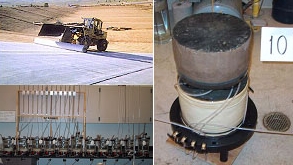Geoengineering

Program Coordinator:
Christopher A. Bareither
christopher.bareither@colostate.edu
(970) 491-4660
Geoengineering focuses on the study, design, and use of natural geomaterials (soil and rock), geosynthetic (polymer) materials, and other types of man-made materials (industrial by-products with potential for use in engineering applications). Numerous subdisciplines of engineering are encompassed in Geoengineering, and include Geotechnical Engineering, Geoenvironmental Engineering, Geological Engineering, and Geophysical Engineering. The Geoengineering Program at Colorado State University predominantly is focused on education and research in the areas of Geotechnical and Geoenvironmental Engineering.
Geoenvironmental Engineering is the engineering of geologic (earthen) and geosynthetic (polymer) materials for problems related to the protection of human health and the environment. The primary problems addressed by Geoenvironmental Engineers pertain to the protection of uncontaminated regions of the subsurface as well as the remediation or cleanup of regions of the subsurface that have been contaminated by one or more events (e.g., industrial chemical spills, leaking waste containment facilities, leaking above-ground and underground storage tanks, infiltration of pesticides, etc.).
The nature of the problems addressed in Geoenvironmental Engineering is diverse and solutions typically require expertise of a variety of professionals who possess a similar diversity in terms of educational background and training. Accordingly, the Geoenvironmental Engineering program at CSU is an interdisciplinary program representing the intersection of Environmental Engineering, Geotechnical Engineering, and Groundwater Engineering. Students in Geoenvironmental Engineering typically receive formal in-depth education in one of the three primary sub-disciplines of Geoenvironmental Engineering, as well as formal education in one or both of the other sub-disciplines and in several supporting science based disciplines (e.g., geological sciences, soil sciences).
Geotechnical Engineering employs concepts of soil and rock mechanics to the analysis and design of geotechnical structures such as (i) shallow and deep foundations, (ii) retaining walls and structures, (iii) excavations and excavated slopes, (iv) earth dams and embankments, and (v) liners and covers for waste containment facilities (e.g., landfills). Since an advanced degree normally is required for engineers working in this field, the program prepares students to solve complex geotechnical problems based on a fundamental understanding of geomaterial behavior and use of modern tools for geotechnical design and analysis. State-of-the-art computing and experimental facilities are used extensively in the teaching and research conducted by faculty and students.